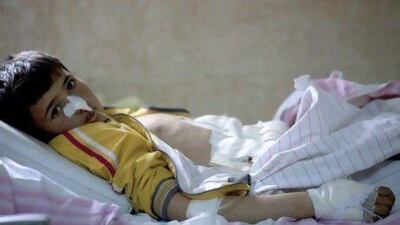The United Nations and Arab League special envoy to Syria, Kofi Annan, warned yesterday that further militarisation in Syria would make the conflict there worse.
He cautioned about "the possible effect of Syria on the region if there is any miscalculation".
"I hope that no one is very seriously thinking of using force in this situation," Mr Annan said after talks in Cairo with Arab League Secretary General Nabil Al Arabi.
US Army Gen Martin Dempsey, chairman of the joint chiefs of staff, told the US Senate foreign relations committee on Wednesday that US President Barack Obama had ordered a Pentagon review of military options in Syria.
The committee chairman, US Senator John Kerry, told CBS's This Morning yesterday that there are stark differences between Syria and Libya, where Nato air strikes helped topple Muammar Qaddafi last year. Mr Kerry said Washington "can't just jump up some morning and say, `Let's go and drop some bombs on Syrian tanks."'
Mr Annan is scheduled to travel to Damascus tomorrow, where he likely will meet Syrian President Bashar Al Assad.
Yesterday a child was among six people killed across Syria, said the Syrian Observatory for Human Rights, which this week put the number of people killed since the uprising against Mr Al Assad's regime began at almost 8,500. At the UN Security Council in New York yesterday, Russia accused the prime minister of Libya of hosting a training camp for Syrian rebels and of ignoring civilian deaths from months of Nato air strikes in Libya.
Vitaly Churkin, Moscow's UN envoy, used the occasion of Libyan prime minister Abdurrahim El Keib's visit to New York to confront him in public.
"We have received information that in Libya, with the support of the authorities, there is a special training centre for the Syrian revolutionaries and people are sent to Syria to attack the legal government," Mr. Churkin charged.
"This is completely unacceptable," he said. "This activity is undermining stability in the Middle East."
Mr Churkin said members of Al Qaeda were among those being trained. "Is the export of revolution not turning into the export of terrorism?" he asked.
Mr El Keib angrily responded in the council chamber. "I hope the reason for raising this matter will not be to impede or prevent the international community from interfering in other states where their people are being massacred and killed at the hands of their rulers."
The Russian envoy also laid into Nato's months-long air campaign in Libya that supported the rebels' drive to oust Qaddafi. Russia has long charged that Nato exceeded its Security Council mandate, which Moscow did not oppose, to protect civilians with a no-fly zone.
"How is it possible that Nato does not take responsibility for this?" Mr Churkin asked. "We expect that Nato will recognise civilian casualties, will excuse itself and say it is prepared to pay appropriate compensation."
He said responsibility for civilian deaths extended to Mr El Keib's government. "Their attention on the issue … will be proof of their commitment to the protection of human rights."
Mr Churkin also called for dialogue between Tripoli and Benghazi over the latter's declaration of semi-autonomy. "Otherwise the situation in Benghazi will turn into a tragedy," he said.
Mr Churkin's charge about the training camps and the situation in Benghazi was ignored by the rest of the council. But his attack on Nato elicited angry responses from the US, France, Germany and Mr El Keib.
"I regret that our Russian colleague has found it necessary to raise this old canard yet again in the Security Council regarding Nato," said US Ambassador Susan Rice.
She said a March 2 UN report referred to by Mr Churkin had concluded that Nato conducted a "highly precise" campaign with a "demonstrable" attempt to avoid civilian causalities. This was echoed by the German and French envoys.
China supported the Russian position. It pointed out that the UN report and media accounts indicated that non-military targets were struck by Nato leading to civilian causalities and called for a further UN investigation.
While saying Nato had sought to avoid civilian deaths, the UN report says that in some cases there were "confirmed civilian causalities" and that some targets "show no evidence" of a military purpose.
In November Anders Fogh Rasmussen, the Nato secretary general, said, "We have carried out this operation very carefully, without confirmed civilian casualties."
But a New York Times investigation published in December found that at least 29 women or children, often asleep at home, were killed by Nato air strikes. In all, more than 70 civilians may have been killed, the paper said.
Mr El Keib appeared to downplay persistent reports of widespread human-rights abuses by pro-government forces against remnants of Qaddafi supporters. The UN report accused the rebels of war crimes and crimes against humanity. Amnesty International has described the rebel groups as "out of control".
"The refusal of many to disarm or join the regular forces are threatening to destabilise Libya," according to a recent Amnesty report. These gangs "hinder the much-needed building of accountable state institutions based on the rule of law, and jeopardise the hopes of millions of people who took to the streets a year ago to demand freedom, justice and respect for human rights and dignity."
Amnesty accused the rebels of torture, arbitrary detentions, destruction of property and summary executions.
In response, Mr El Keib acknowledged that "there have been abuses of human rights." But he dismissed them as "isolated cases, and not systematic ones".
He said they were "due to the fact that some revolutionaries were not aware of the principles of humanitarian international law".
foreign.desk@thenational.ae
With additional reporting by the Associated Press and Agence France-Presse

